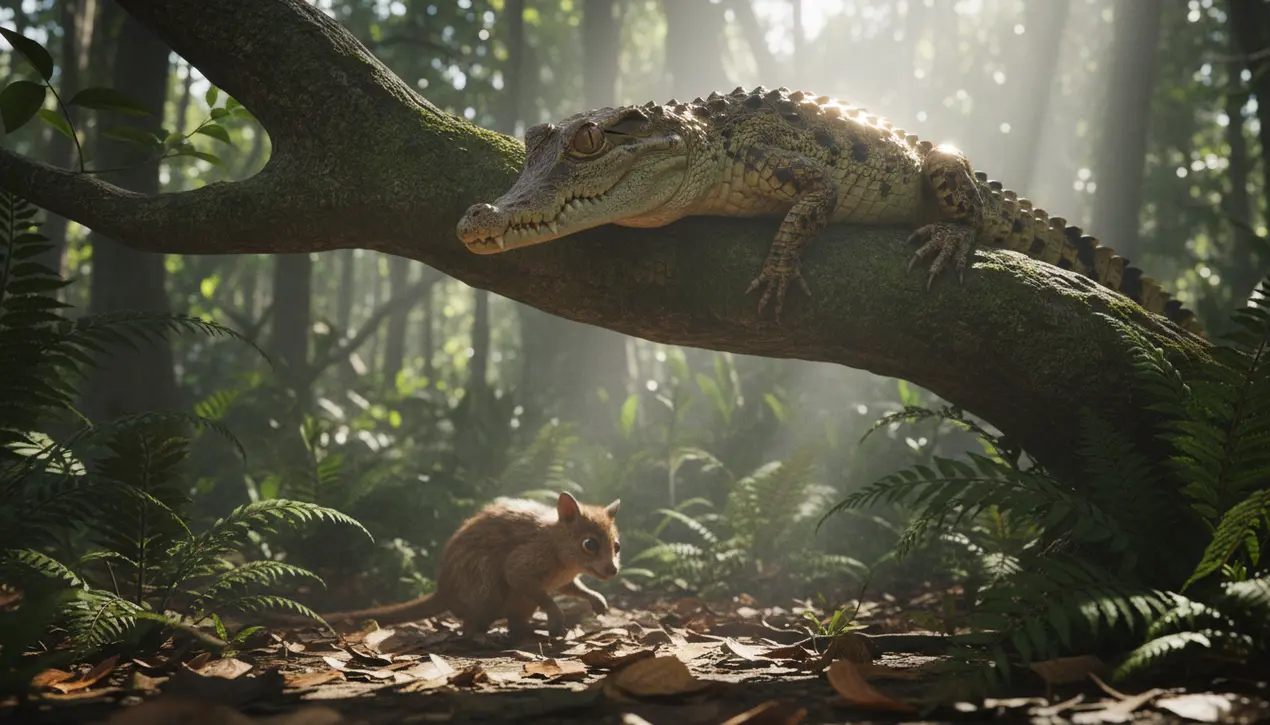
Sciencearchaeology
Ancient Australian crocodiles hunted from trees.
TH
Thomas Green
3 hours ago7 min read
In a revelation that fundamentally recalibrates our understanding of prehistoric predators, scientists have uncovered compelling evidence that ancient Australian crocodiles were not the sluggish, riverbank-lurking behemoths of popular imagination but agile, tree-climbing hunters that stalked their prey with a leopard's calculated grace. This paradigm-shifting discovery, emerging from meticulous analysis of fossilized trackways and skeletal adaptations in the Riversleigh World Heritage Area in Queensland, paints a vivid portrait of a bygone ecosystem where the rules of engagement were wildly different.Picture the Miocene epoch, some 15 to 5 million years ago: a lush, wet rainforest where a creature like *Trilophosuchus rackhami*, a relatively small, terrestrial crocodilian, possessed the limb proportions and claw structure not for mere paddling, but for genuine arboreal capability. These animals, some estimated to have reached up to two meters in length, would have scaled low-hanging branches, using the elevated vantage point not just for basking, as some modern crocodilians are known to do, but for active, strategic predation.They were the snipers of the ancient outback, waiting in silent ambush to drop upon unsuspecting marsupials, large insects, and early birds that wandered below—a hunting strategy more akin to a big cat than to their modern, aquatic descendants. Dr.Paul Willis, a paleontologist involved with the research, draws a stark comparison, noting that this behavior shatters the monolithic view of crocodiles as simple 'sit-and-wait' predators, revealing a lineage of far more dynamic and ecologically diverse animals. This finding forces a broader reconsideration of the evolutionary pathways within the crocodylomorph group, suggesting that the dominance of semi-aquatic ambush predation was not the only successful model.In fact, it opens a fascinating window into evolutionary convergence, where distantly related species—reptiles and mammals—arrive at similar survival solutions, like arboreal hunting, when faced with analogous environmental pressures. The implications ripple beyond paleontology into our understanding of modern ecosystems; if such behavior was possible in the past, it challenges our assumptions about the rigidity of predator niches.The discovery also underscores the unique and almost alien nature of Australia's evolutionary history, a continent that has continually served as a natural laboratory for the most bizarre and wonderful forms of life. As climate shifts gradually transformed those dense rainforests into the more arid landscapes we recognize today, these arboreal specialists likely faced an existential crisis, their specialized niche vanishing and leaving the more generalized, aquatic crocodilians to inherit the future.It’s a poignant reminder of evolution's relentless, unforgiving tide, where today's apex innovation can become tomorrow's evolutionary dead end. This research, published in a landmark paper, doesn't just add a new species to the fossil record; it rewrites a chapter in the textbook of life, reminding us that the past was a place of constant, dynamic experimentation, far stranger and more thrilling than we often dare to imagine.
#featured
#paleontology
#crocodiles
#ancient predators
#tree-climbing
#Australia
#fossil evidence
Stay Informed. Act Smarter.
Get weekly highlights, major headlines, and expert insights — then put your knowledge to work in our live prediction markets.
Comments
Loading comments...
© 2025 Outpoll Service LTD. All rights reserved.